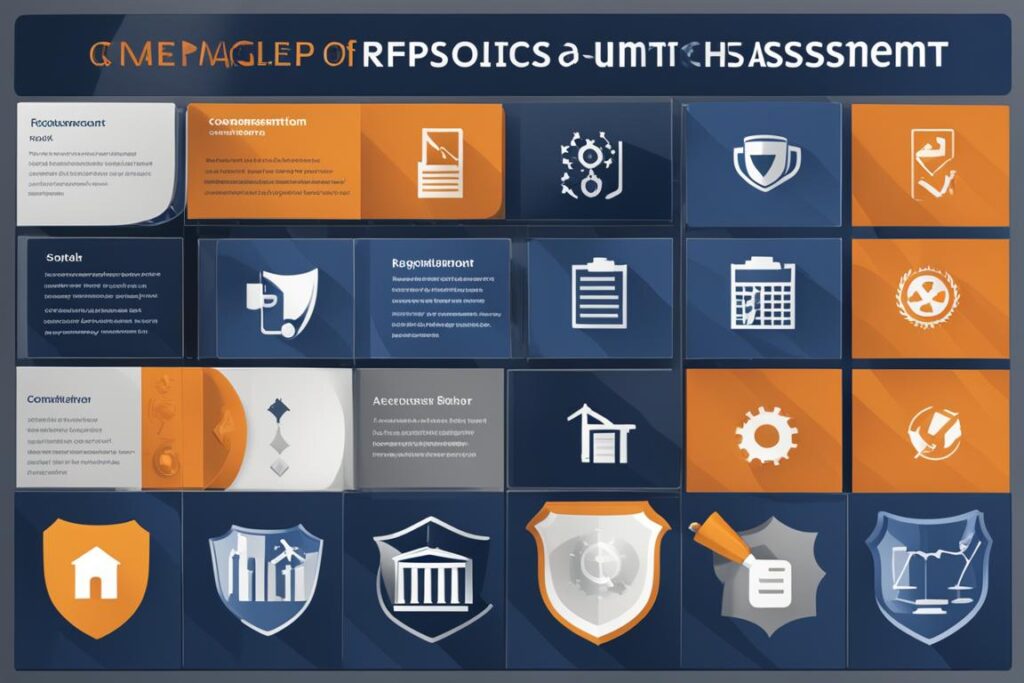A Politically Exposed Person (PEP) is an individual who, due to their prominent position or influence, is at a higher risk of being involved in bribery, corruption, and other financial crimes. Organizations must have a clear understanding of PEPs to ensure compliance with financial crime regulations and protect their reputation.
PEP compliance is essential for businesses in regulated industries and those operating in international markets. By identifying and conducting thorough due diligence on PEPs, organizations can mitigate the risks associated with their involvement in illicit activities.
Key Takeaways:
- Politically Exposed Persons (PEPs) are individuals with significant influence who are more likely to engage in financial crimes.
- PEP compliance is crucial for organizations to adhere to financial crime regulations.
- PEP status can include government officials, diplomats, judicial figures, and individuals in state-owned enterprises.
- Close business associates and family members of PEPs are also considered high-risk individuals.
- Implementing robust risk management measures and conducting thorough due diligence are essential for PEP compliance.
Who is Considered a Politically Exposed Person?
Politically Exposed Persons (PEPs) are individuals who hold prominent positions or have significant influence, making them susceptible to involvement in financial crimes such as corruption and bribery. Various categories of people are classified as PEPs, including government officials, judicial members, and individuals working in state-owned enterprises and international sports committees. Additionally, close associates and immediate family members who have business relationships or joint beneficial ownership with a PEP are also considered politically exposed. It’s important to note that the specific criteria for PEP classification may vary between countries.
When conducting PEP due diligence, organizations need to be aware of the broad range of individuals who fall under the PEP definition. By properly identifying PEPs, organizations can effectively manage the associated risks and comply with financial crime regulations.
The Categories of Politically Exposed Persons
- Government officials: Members of legislative and executive bodies, as well as individuals serving diplomatic roles
- Judicial members: Judges, magistrates, and other individuals working in the judiciary
- State-owned enterprises: Executives and key personnel in government-controlled or influenced enterprises
- International sports committees: Officials and decision-makers in international sports organizations
- Close associates: Individuals with business relationships or joint beneficial ownership with a PEP
- Immediate family members: Spouses, parents, children, and siblings of PEPs
By understanding the categories of individuals considered PEPs, organizations can conduct comprehensive PEP due diligence and implement effective risk mitigation strategies. This ensures compliance with PEP regulations and enhances the overall integrity of their operations.
Identifying and comprehending the various categories of Politically Exposed Persons is crucial for organizations to effectively manage the risks associated with financial crimes. By conducting thorough PEP due diligence and implementing robust risk mitigation measures, businesses can safeguard themselves against potential reputational damage and regulatory consequences.
| Category |
Description |
| Government officials |
Members of legislative and executive bodies, individuals serving diplomatic roles |
| Judicial members |
Judges, magistrates, and individuals working in the judiciary |
| State-owned enterprises |
Executives and key personnel in government-controlled or influenced enterprises |
| International sports committees |
Officials and decision-makers in international sports organizations |
| Close associates |
Individuals with business relationships or joint beneficial ownership with a PEP |
| Immediate family members |
Spouses, parents, children, and siblings of PEPs |
Compliance Regulations for Politically Exposed Persons
When conducting business in different countries, organizations must adhere to the specific local regulations governing Politically Exposed Persons (PEPs). Compliance with these PEP regulations is essential to mitigate the risks associated with financial crimes and ensure the integrity of business transactions.
“Compliance with PEP regulations is crucial for organizations operating in regulated industries.”
PEP compliance typically involves implementing enhanced due diligence measures and establishing a clear PEP policy. These measures are necessary to identify and monitor PEP relationships effectively, as well as prevent money laundering, bribery, and corruption. Financial institutions and other organizations handling high-risk transactions must have robust PEP policies in place to address the potential risks and implement appropriate risk management measures.
Some common PEP compliance regulations include:
- Enhanced Due Diligence: Organizations must conduct thorough background checks and gather comprehensive information about PEPs, including their source of wealth, political affiliations, and close associations.
- Ongoing Monitoring: Continuous monitoring of PEP relationships is necessary to detect any changes in their status, such as a shift from being a PEP to a politically unexposed person.
- Clear PEP Policies: Organizations must establish clear policies and procedures that outline how they will identify, assess, and manage PEP risks. These policies should comply with local regulations and be regularly updated to reflect any changes.
Implementing effective PEP compliance strategies requires organizations to strike a balance between business opportunities and maintaining regulatory compliance. By prioritizing PEP due diligence and establishing robust risk management procedures, organizations can safeguard their reputation, protect themselves from financial crimes, and maintain the trust of their stakeholders.

| PEP Compliance Regulations |
Description |
| Enhanced Due Diligence |
Thorough background checks and comprehensive information gathering about PEPs. |
| Ongoing Monitoring |
Continuous monitoring of PEP relationships to detect changes in status. |
| Clear PEP Policies |
Establishing clear policies and procedures for identifying, assessing, and managing PEP risks. |
Identifying Politically Exposed Persons
Identifying Politically Exposed Persons (PEPs) can be a challenging task due to the broad and evolving nature of PEP criteria. Many organizations use PEP screening methods to identify individuals who meet the PEP definition and assess the associated risk.
PEP screening involves thorough analysis of various sources, including official government lists, public records, and commercial databases. By comparing customer data with these sources, organizations can identify potential PEPs and determine their level of risk.
Conducting a comprehensive risk assessment is essential to accurately identify PEPs and determine the appropriate level of due diligence required for each individual. This assessment helps organizations understand the potential financial crime risks associated with engaging PEPs and take appropriate risk management measures.
It is important to note that PEP screening and risk assessment should be an ongoing process, as PEP status may change over time. Regularly updating and monitoring PEP data ensures that organizations stay compliant with regulations and effectively mitigate the risks associated with PEPs.
“PEP screening allows organizations to proactively identify individuals with a higher risk of involvement in bribery, corruption, and financial crimes. By conducting thorough risk assessments, organizations can determine the appropriate due diligence required for each individual.”
PEP Screening Sources
PEP screening relies on multiple sources to accurately identify and assess PEPs. These sources include:
- Official Government Lists: Government agencies maintain lists of individuals holding prominent positions or influential roles that qualify them as PEPs.
- Public Records: Public databases and registries provide information on individuals’ political ties, business affiliations, and financial transactions.
- Commercial Databases: Third-party providers compile comprehensive databases that consolidate PEP-related information from various reliable sources.
By leveraging these sources and implementing robust screening processes, organizations can enhance their ability to identify and manage PEP risks effectively.
PEP Risk Assessment
Conducting a thorough risk assessment is a critical step in the PEP identification process. Organizations assess various factors to determine the level of risk associated with engaging individuals flagged as PEPs. These factors may include:
- Position or Role: The significance and influence of the individual’s government, diplomatic, or judicial position.
- Business Associations: Close business relationships or joint beneficial ownership with a PEP.
- Family Ties: Immediate family members of PEPs, as they potentially benefit from their connections.
Based on the risk assessment, organizations can establish appropriate due diligence measures tailored to each individual’s risk profile, ensuring compliance with regulations and minimizing exposure to financial crime risks.
| Risk Level |
Due Diligence Actions |
| High Risk |
Enhanced due diligence measures, including thorough background checks, financial analysis, and ongoing monitoring. |
| Moderate Risk |
Standard due diligence procedures, such as verifying identity, reviewing financial records, and assessing business relationships. |
| Low Risk |
Basic due diligence measures, like verifying identity and conducting minimal checks on financial records. |
Importance of PEP Due Diligence
Due diligence is a crucial component in effectively managing the risks associated with Politically Exposed Persons (PEPs). Organizations must conduct enhanced due diligence procedures when dealing with PEPs to mitigate the potential financial crime risks they pose. PEP due diligence involves gathering comprehensive information about the individual’s background, financial affairs, and associations. By conducting thorough PEP risk assessments, organizations can make informed decisions about establishing or continuing business relationships with PEPs.
The Value of PEP Due Diligence
PEP due diligence plays a vital role in minimizing the risks associated with engaging with politically exposed individuals. It provides organizations with a deeper understanding of the PEP’s background, potential conflicts of interest, and connections to other high-risk individuals or entities.
By conducting comprehensive due diligence, organizations can:
- Assess the credibility and integrity of the PEP
- Determine the level of potential risk posed by the PEP
- Evaluate the potential impact on the organization’s reputation and compliance
- Identify any red flags or indicators of potential financial crimes
Thorough PEP due diligence enables organizations to make informed decisions about the suitability of establishing or continuing business relationships with PEPs. It helps ensure compliance with regulatory requirements and mitigates the risks associated with money laundering, corruption, and bribery.
The Process of PEP Due Diligence
PEP due diligence involves gathering and analyzing relevant information about the PEP. The process typically includes:
- Obtaining comprehensive identification and background details, such as full name, date of birth, and nationality
- Reviewing the PEP’s public records, including media coverage, official appointments, and public statements
- Conducting financial analysis to identify any unusual wealth accumulation or discrepancies
- Assessing the PEP’s business affiliations and connections to other high-risk individuals or entities
- Verifying the source of the PEP’s funds and assessing the transparency of their financial activities
By conducting a thorough PEP risk assessment, organizations can gain a holistic view of the PEP’s background and associations. This information forms the basis for evaluating the potential risks and making informed decisions about engaging with the PEP.
Importance of Technology in PEP Due Diligence
Given the complexity and evolving nature of PEP due diligence, leveraging technology-driven solutions can significantly enhance the effectiveness and efficiency of the process. Advanced software tools can automate data collection, analysis, and risk assessment, streamlining the overall due diligence process.
Using technology-driven solutions, organizations can:
- Access reliable and up-to-date PEP lists and databases
- Automate the screening and monitoring of PEP relationships
- Utilize artificial intelligence algorithms to identify potential risks and indicators of financial crimes
- Centralize and manage due diligence documentation and audit trails
By embracing technology, organizations can enhance the accuracy and consistency of their PEP due diligence processes while reducing the chances of human errors or oversights.
Regulations and Risk Management for PEPs
Financial institutions and other regulated organizations are required to adhere to specific PEP regulations to combat financial crimes such as money laundering and corruption. These regulations necessitate conducting comprehensive PEP risk assessments and implementing effective risk management measures. By doing so, organizations can mitigate the potential risks associated with PEP relationships and safeguard their operations.
Taking a proactive approach to risk management is crucial. This involves ongoing monitoring of PEP transactions, regular reviews of PEP relationships, and the establishment of internal controls to detect and prevent illicit activities. By implementing these risk management strategies, institutions can better protect themselves against the potential financial and reputational damages associated with PEPs.
Below is a table summarizing key components of PEP risk management:
| Risk Management Strategies |
Description |
| Ongoing Monitoring of PEP Transactions |
Regularly monitoring PEP transactions and activities to identify any suspicious or high-risk behavior. |
| Regular Reviews of PEP Relationships |
Evaluating the ongoing need for business relationships with PEPs and reassessing the associated risks. |
| Implementation of Internal Controls |
Establishing robust internal controls that enable the detection and prevention of illicit activities associated with PEPs. |

“Effective risk management strategies are essential for organizations to navigate the complex landscape of PEP compliance. By conducting thorough risk assessments and implementing proactive risk management measures, institutions can mitigate the financial crime risks associated with PEPs.”
Proactively managing risks associated with PEPs allows organizations to comply with PEP regulations, protect themselves from potential legal and reputational consequences, and maintain the integrity of their operations. By staying up to date with evolving regulations and implementing robust risk management practices, organizations can effectively navigate the challenges posed by PEP relationships.
Screening for Politically Exposed Persons
Screening for Politically Exposed Persons (PEPs) is a crucial step in mitigating the risks associated with financial crimes. By conducting thorough checks, organizations can identify individuals who meet the PEP criteria and ensure compliance with PEP screening requirements. This process involves comparing customer data with government lists, commercial databases, and other reputable sources to determine PEP status.
PEP screening is an ongoing process that should include regular monitoring to capture any changes in a customer’s PEP status. This ensures organizations stay updated and can promptly adapt their risk management measures accordingly. By effectively screening for PEPs, organizations can prevent potential fraud, corruption, and money laundering activities.
“Effective PEP screening is vital for organizations to mitigate the risks associated with financial crimes.”
The Importance of PEP Screening
PEP screening plays a crucial role in identifying high-risk individuals within an organization’s customer base. By identifying PEPs, organizations can conduct enhanced due diligence to gain a deeper understanding of their background, associations, and financial affairs. This enables organizations to make informed decisions about establishing or continuing business relationships with PEPs.
“Thorough PEP screening allows organizations to determine the appropriate level of due diligence required for each individual.”
Compliance with PEP Screening Requirements
Compliance with PEP screening requirements is essential for organizations to meet regulatory obligations and maintain a strong risk management framework. Organizations should establish robust policies and procedures to ensure consistent and accurate PEP screening processes. Implementing technology-driven solutions can streamline the screening process, improve accuracy, and keep organizations up to date with the latest PEP regulations.
“Compliance with PEP screening requirements is crucial for organizations to mitigate the risks associated with financial crimes.”
PEP Screening Sources
| Source |
Pros |
Cons |
| Government Lists |
– Official and comprehensive data
– Generally reliable
– Updated regularly |
– May not capture all PEPs
– Limited availability in some countries |
| Commercial Databases |
– Extensive coverage
– Quick access to data
– Regularly updated |
– Potential inaccuracies
– Additional cost |
| Public Records |
– Widely accessible
– Comprehensive information |
– Manual search required
– Time-consuming |
Effective PEP screening involves utilizing a combination of these sources, ensuring comprehensive coverage and minimizing the risk of oversight. By regularly reviewing and updating screening processes, organizations can stay compliant and safeguard themselves against financial crimes.
PEP Compliance Challenges and Solutions
Achieving full compliance with PEP regulations can be a complex task for organizations due to the ever-evolving nature of PEP criteria and the need for ongoing monitoring. However, there are effective solutions and risk management procedures that can help organizations overcome these challenges.
“Implementing robust risk management procedures and leveraging technology-based solutions can help organizations overcome PEP compliance challenges.”
One of the key challenges organizations face is the dynamic nature of PEP criteria. As regulations and definitions change, it can be difficult to keep up with the latest requirements. This ongoing evolution requires organizations to consistently update their compliance practices and adapt to the changes.
To address this challenge, leveraging technology-based solutions can be highly beneficial. Automated PEP screening tools and risk assessment platforms can streamline the compliance process and ensure organizations stay up to date with the latest PEP regulations. These tools enable efficient screening and assessment, enhancing accuracy and reducing the manual effort required.
Implementing robust risk management procedures is another crucial aspect of ensuring PEP compliance. Organizations should establish clear policies and procedures for identifying and managing PEP relationships. This includes conducting thorough PEP risk assessments to determine the level of due diligence required for each individual.
In addition, ongoing monitoring of PEP relationships is essential to mitigate risks effectively. Regular reviews and updates ensure that any changes in a customer’s PEP status are promptly identified and properly addressed.
Benefits of Technology-Based Solutions:
The use of technology-based solutions offers several advantages in PEP compliance:
- Streamlined compliance process
- Enhanced accuracy in PEP screening
- Efficient risk assessment and due diligence
- Timely identification of changes in PEP status
- Improved overall risk management
By leveraging these solutions, organizations can effectively manage PEP compliance challenges and ensure adherence to regulations. It allows them to focus on their core operations while maintaining a robust risk management framework.

| Challenges |
Solutions |
| Dynamic nature of PEP criteria |
Implementing technology-based solutions for efficient screening and automated risk assessment. |
| Ensuring up-to-date compliance practices |
Regularly updating policies and procedures, along with ongoing monitoring of PEP relationships. |
| Managing the volume of PEP screenings |
Leveraging automated screening tools to streamline the compliance process. |
| Timely identification of changes in PEP status |
Implementing ongoing monitoring processes and conducting regular reviews of PEP relationships. |
PEP Compliance Best Practices
To ensure effective PEP compliance, organizations should establish comprehensive policies and procedures that cover all aspects of PEP screening and due diligence. By implementing best practices, organizations can mitigate the risks associated with PEPs and ensure compliance with PEP regulations, PEP screening, and PEP due diligence. The following strategies and measures should be considered:
1. Conduct Regular Training
PEP compliance training is crucial for employees involved in the compliance process. Training sessions should focus on understanding PEP regulations, screening techniques, and due diligence procedures. By keeping employees informed and knowledgeable, organizations can strengthen their overall compliance efforts.
2. Establish Clear Escalation and Reporting Channels
Having clear escalation and reporting channels is essential for effective PEP compliance. Employees should feel comfortable reporting any suspicious activities or potential PEP relationships. Organizations must establish a robust system to handle these reports and escalate them appropriately for further investigation.
3. Implement Robust Internal Controls
To detect and prevent suspicious activities, organizations should implement robust internal controls. These controls may include transaction monitoring systems, identity verification processes, and risk assessment frameworks. By regularly reviewing and enhancing internal controls, organizations can stay proactive in preventing financial crimes related to PEPs.
4. Ensure Ongoing Monitoring
Ongoing monitoring of PEP relationships is crucial to maintain compliance. It allows organizations to detect any changes in a customer’s PEP status or potential red flags that may arise over time. By implementing robust monitoring systems, organizations can stay vigilant and take necessary actions to mitigate risks associated with PEPs.
Implementing these best practices will help organizations strengthen their PEP compliance, screening, and due diligence procedures. By proactively managing the risks associated with PEPs, organizations can protect their reputation, ensure regulatory compliance, and contribute to a safer financial environment.
| Best Practices |
Description |
| Conduct Regular Training |
Train employees on PEP compliance, screening techniques, and due diligence procedures. |
| Establish Clear Escalation and Reporting Channels |
Ensure employees have a clear process for reporting potential PEP relationships and suspicious activities. |
| Implement Robust Internal Controls |
Deploy transaction monitoring systems, identity verification processes, and risk assessment frameworks. |
| Ensure Ongoing Monitoring |
Maintain vigilant monitoring of PEP relationships to detect any changes or red flags. |






